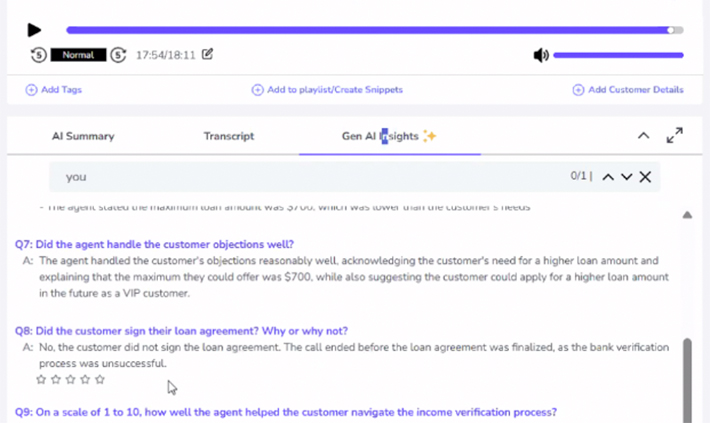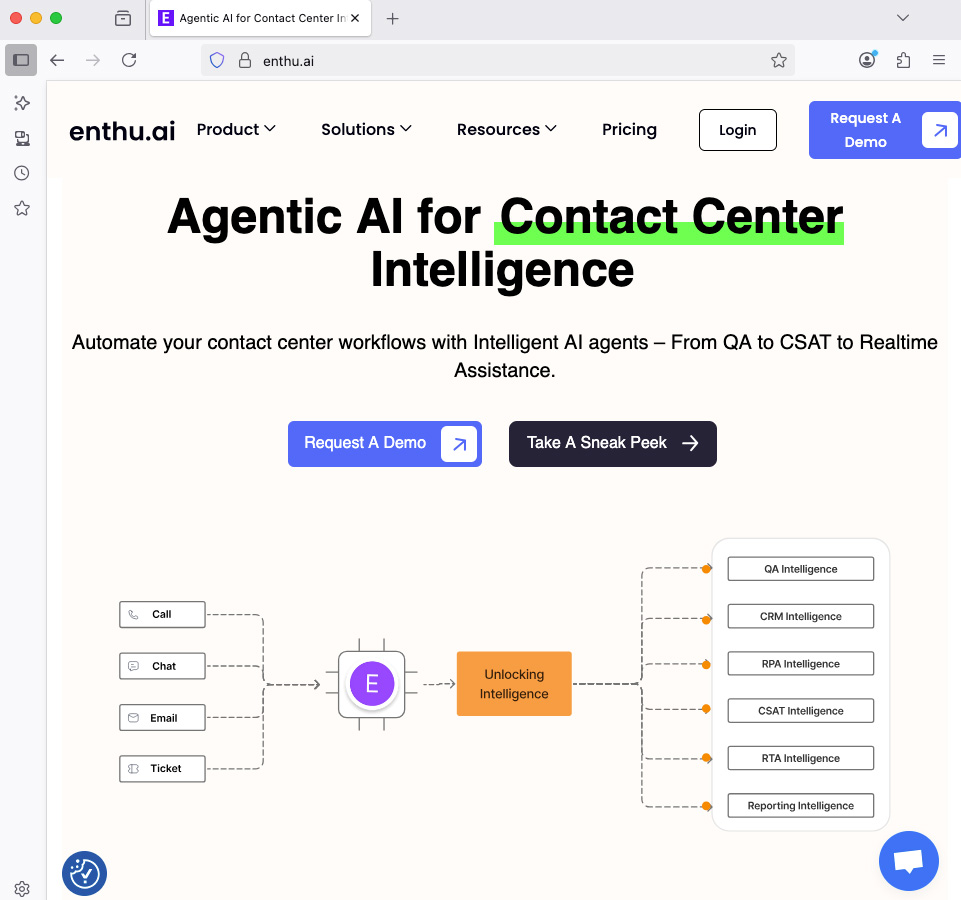How Are Your Sales Calls Going? How One AI System Can Score Performance
 The subjectivity era of evaluating sales reps is over. Sales calls can now be dissected down to every little nuance of why something went right or wrong, and it can be done at scale with no human bias. These interactions can also be aggregated to determine strengths, weaknesses, trends, compliance, confidence levels, and more, all thanks to AI and technology available right now.
The subjectivity era of evaluating sales reps is over. Sales calls can now be dissected down to every little nuance of why something went right or wrong, and it can be done at scale with no human bias. These interactions can also be aggregated to determine strengths, weaknesses, trends, compliance, confidence levels, and more, all thanks to AI and technology available right now.
“The way [our] platform works is we integrate with the dialer,” says Atul Grover, Co-founder and VP of Sales for Enthu.AI. “Typically, what we have seen with our clients, the calls are automatically pushed within two or three minutes after the conversations are done.”
With Enthu, a company’s call recordings go through their AI system to be analyzed based on either their own scorecard, the client’s, or both. Whatever the outcome of the call, lost sale, closed deal, or neither, management receives a report to see how the rep performed. Did the rep try to build rapport? What were the objections? Did they handle objections well? Did the rep sound confident when answering difficult questions? Across hundreds or thousands of calls each week, any rep can get an unbiased report card of their strengths and weaknesses. These metrics can then be compared with peers, without the worry of human bias deciding the outcome. They can’t blame the boss for simply favoring another rep, for example.
Originally, when Enthu started, they focused mainly on keyword spotting for compliance purposes, evaluating whether or not reps were saying what they were supposed to across thousands of calls. But that had its limitations.
“That’s how we started our journey, using purely keyword spotting,” Grover says, “but the challenge over there is that you can’t basically expand or scale it. So that’s why we use our AI approach, where it’s primarily intent-based rather than keyword-based. So we look at the intent of all the conversations.”
Rather than AI replacing sales reps, as some theorize might happen over time, it can be used to make them a whole lot better. And this is already being employed today. Enthu, for example, is currently being used in financial services, healthcare, home industries, property management, and more. Grover says clients are already using it to measure disparities in call performance and then using those insights to coach reps who score on the lower end.
“Our platform also offers the ability to create a playlist for the good recordings, which you can use to train your new agents,” Grover says. “So rather than training in general that’s like, ‘okay, this is our company product, this is our company offerings, you should talk like this,’ they can share those good recordings with the new agents so they can listen to how their good sales agents are doing, and then get trained on the real data.”

Recording calls and finding good ones is not a new capability, anyone can do that. But it’s the ability to identify certain call situations at scale that makes all the difference when trying to evaluate and coach. If a new objection is tripping up the team, management can pull every instance it has come up, calculate its frequency, and use that information to determine the best path forward. These are things that would typically rely on the “vibe and feel” of the sales floor, as reps relay information to the boss, who must then assess whether the trend is legitimate or just a statistical blip.
Independent analysis can also be critical when a company is evaluating a lead source or referral partner, especially if that partner is also expecting to be judged objectively. And when the lead source changes, the AI can be told in advance whether the calls are outbound or inbound, hot or cold, or how they differ from other types of calls the company handles. The resulting evaluations can then reflect those circumstances.
Success, in this way, can be gamified, allowing reps to strive for higher grades across all areas of a call and objectively compare themselves to colleagues in an emotion-free environment. The AI can score each call or aspect of a call on a scale from 1 to 10 and produce a summary score for each rep over a day, week, or month, unlocking new motivational challenges. An underperforming rep could be recognized for a top score in overcoming objections, for example, even if they didn’t close the most deals. Picture a Broker Battle, but the judge is an AI.
 And it’s not just sales. Clients can also use the technology for compliance, to determine whether proper disclosures were made, correct terminology used, and whether the tone of the call remained positive.
And it’s not just sales. Clients can also use the technology for compliance, to determine whether proper disclosures were made, correct terminology used, and whether the tone of the call remained positive.
“It’s definitely going to be great help for the sales organization,” Grover says. “And if we talk about the lending industry, you talk about compliance and everything, or let’s say the collections department, because they want to make sure that their agents are not screwing up, because there’s legalities involved if they mess up anything. So that’s what our system will flag, where they are doing right or where they’re doing wrong.”
If a client wants to keep keyword spotting as part of the analysis, they can. Grover says pre-set words can be marked as zero-tolerance or flagged for management. The more data and calls the system analyzes, the better it gets.
Grover adds that even if a client isn’t ready to fully integrate Enthu, they can still use old call recordings to access analytics.
“We have some customers in that space where they don’t have a dialer but they still have the recording,” Grover says. “So our platform also allows to upload the recordings directly by the client itself, on the platform itself, where they can upload the calls manually, then you’re still going to get the same intelligence, same analytics, same scorecard mechanism, even if you upload it manually.”
Last modified: July 21, 2025Sean Murray is the President and Chief Editor of deBanked and the founder of the Broker Fair Conference. Connect with me on LinkedIn or follow me on twitter. You can view all future deBanked events here.































